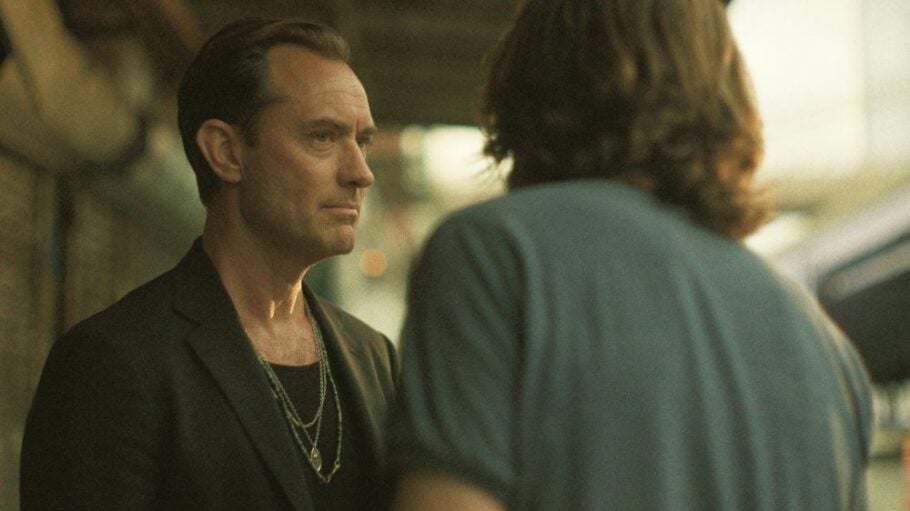The central metaphor of the Netflix crime thriller “Black Rabbit” is obvious enough. When Brooklyn-born brothers, ex-bandmates and restaurant co-founders Jake (Jude Law) and Vince Friedken (Jason Bateman) reunite after a prolonged estrangement, the combustible mix of Vince’s gambling debts, Jake’s ambition and both men’s childhood trauma sends them down — say it with me now — a rabbit hole of hustle, codependency, resentment and, as foreshadowed in the limited series’ opening scene, armed robbery. But for these kinds of stories to work, the audience has to want to follow the protagonists down the namesake spiral that leads to their unraveling. That’s where this eight-episode show stumbles.
Created by married couple Zach Baylin (“King Richard”) and Kate Susman, “Black Rabbit” takes heavy inspiration from New York’s recent past, though it’s technically set in the present day. In everything from its name — also the Black Rabbit — to its celebrated female chef (Amaka Okafor) to its clubby atmosphere, the Friedkens’ restaurant is a dead ringer for the Spotted Pig, the hottest restaurant of the mid-2000s. (The Friedkens’ surname is just two letters removed from that of disgraced restaurateur Ken Friedman, whose misdeeds map onto some revelations in later episodes.) The Rabbit is located in a waterfront neighborhood that has long since retreated from the bleeding edge of cool; the very idea of a restaurant as the nexus of a rapidly evolving city is an homage to Richard Price’s 2008 novel “Lush Life.” The soundtrack, sprinkled with hits from Interpol, Cold War Kids and The Strokes, is an especially evocative throwback to the so-called indie sleaze era.
All these anachronisms are at least a matter of inside baseball, if a hindrance to Baylin and Susman’s attempts to evoke the same textured, realist milieu as the Safdie brothers. (There’s even a stressful set piece in a diamond store, á la “Uncut Gems.”) Vince and Jake themselves are a more substantial issue, both as written and as embodied by Bateman and Law, each of whom is also an executive producer. Bateman — who directs the first two episodes — tends to excel in roles, like Michael Bluth of “Arrested Development” or Marty Byrde of “Ozark,” who present as clean-cut rule followers and only reveal their inner scuzziness over time. Vince, a recovering addict with a scraggly beard, starts too grimy for the actor to capably sell. The elder Friedken is such an unrepentant chaos agent, repeatedly saddling his loved ones with the burden of his many mistakes, that Vince needs to charm the viewer into not actively rooting for him to face consequences. That’s quite the lift, and one Bateman doesn’t manage.
Law’s Jake is a slightly better-suited lead, if only just. But the star has more capably subverted his pretty-boy presentation in prior TV work. Having already played a native New Yorker who’s risen above his station on “The Young Pope” and an outmatched schemer on “Skeleton Crew,” Law’s returns diminish in “Black Rabbit.” Jake’s chemistry-free romance with interior designer Estelle (Cleopatra Coleman) doesn’t help matters. (Most women in “Black Rabbit” exist to sustain collateral damage.) Nor does the entrepreneur’s compulsive need to live beyond his means, embezzling from the Rabbit to afford his rented penthouse while courting investors to fund a lavish new venture. As with Vince, there’s no sense that Jake should wriggle free from the bind he’s put himself in. It’s no coincidence that Oscar winner Troy Kotsur is the ensemble’s clear standout as an out-and-out villain and the owner of Vince’s debts. Kotsur earns our affection rather than assuming it, and also has a point — Vince really ought to pay him back!
Baylin’s background is in features (“Black Rabbit” is his first television credit), a CV that shows in how the series strains to sustain its panicky overwhelm for eight hours. Forsaking the concision of a film or even — á la “The Bear,” to which “Black Rabbit” will inevitably be compared as a frenetic family drama about a restaurant — half-hour episodes, “Black Rabbit” sags in its middle stretch. The final sprint is the most thrilling, with sibling squabbles and climactic action providing much-needed momentum. Until then, however, we’re asked to spend a prolonged stint with two highly unpleasant people. Hospitality is all about a welcoming environment, a golden rule “Black Rabbit” breaks at its peril.
From Variety US
Love Film & TV?
Get your daily dose of everything happening in music, film and TV in Australia and abroad.































